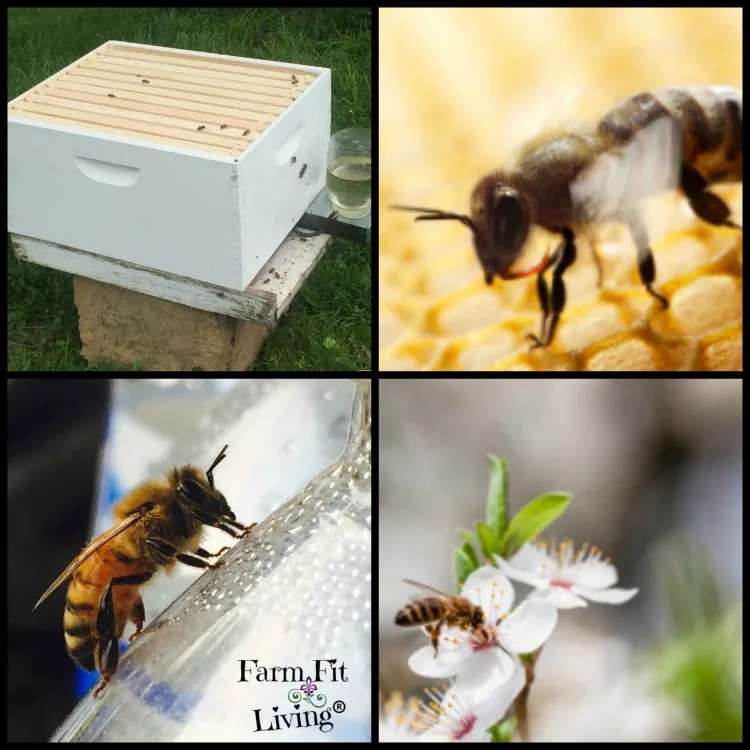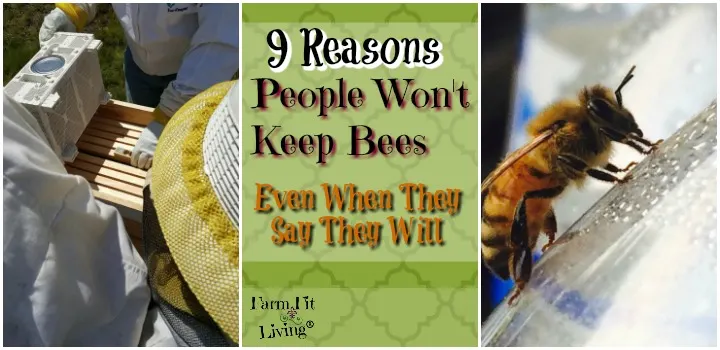Even though the awareness of beekeeping is the cool thing to do, you’ll find many reasons people won’t keep bees.
Ever. I mean, if everyone did it, it wouldn’t be so cool, right? So, what are some challenges keepers face before even starting out?
If you’re here because you’re new to the hobby and looking for reasons to keep bees or even why you shouldn’t do it, you’ve come to the right place. Here’s what you’ll be reading:
- The 9 Most Common Reasons People Won’t Keep Bees
- Best Time to Start a beehive
- Biggest Fears of starting
- The biggest one – How much does it cost to become a beekeeper
I’ve asked for the reasons people won’t keep bees in several of my social media groups. So, these are the 9 most common reasons people won’t keep bees based on their answers from newbeeks to advanced and established keepers.
So, let’s dive in. And, we’ll start with the #1 answer…”Because it’s sooo expensive!”
How Much Does Apiary Cost?
It is expensive to start this hobby. I remember dropping $1200 easy on my first set of beekeeping equipment and packages for my first three hives. Starting a colony with packaged bees really starts to add up! Yowsas!
Even if you follow one of those posts for “how to start a beehive without buying bees” or that will “tell you how to start for free,” you’ll find there is SOME cost involved. Somewhere. There is no free when it comes to this hobby. And beekeeping profit per hive isn’t going to pay out. That’s for the apiary pro..not the beginning newbie.
One thing I will never ever tell you is that you can do this hobby for free if you do it a certain way. But, there are some ways you can start keeping cheaper:
- Some states offer grants for raising honey bees. Check with your state or local USDA offices and local clubs to find out more.
- If you have land with gardens, alfalfa or clover, invite an established keeper to set up a colony.
- Try to avoid shipping costs on equipment. If you can find a more local supply store to purchase supplies.
- Learn where to buy bees local to avoid shipping charges on them as well.
- Build your own equipment. There are lots of plans out there and lots of ways to do it.
Friend, there’s really a lot of ways to keep bees. Period. There may be some wrong ways to do it, but there is never just one right way (depending on the situation, that is).
And not knowing what that “right way” is holds a lot of newbies back from even trying. Let’s talk about the barrier of overthinking it.
Overthinking It
Ok, so we all have some sort of anxiety starting something new. Deep down inside there is just a little bit (or a lot) of questions racing through our minds. Especially when you pay $1200 for a new hobby!
You don’t want to mess up. I know I sure didn’t. And I overthought a LOT of the techniques. From the first night of installing new packages to splitting the boxes in the beginning of the second year.
But in the end, I just did it. I followed my gut and did it. Did I have fear? YES!
The first night after installing my first packages, I couldn’t sleep. After the first inspection, I stayed awake all night. Why? Because my mind was overthinking it…MAJORLY! And you know what?
Everything turned out just fine. My first colonies are still alive and well to this day. You really have to trust those little critters. They know what they need to do…you’re job as keeper is to provide them the resources (food, parasite control, etc) they need to make it through. They do the work and carry on order in their boxes themselves.
They’ve been doing it for thousands of years. The first books of the Bible talks about “the land of milk and honey.” Honey (whether the same honey made by bees) has been around for that long! At least, I’d like to think this honey was made by honey bees.
And now, I’m just overthinking it.
You see, overthinking things leads into full blown fear. And there are a lot of fears holding new keepers back from experiencing the excitement and joys of the sport.
** Read How To Catch A Swarm for FREE Bees
Fear
Here are some of the most common fears and reasons people won’t keep bees:
- Fear of being stung.
- Allergies.
- Killing them all.
- Fear of not knowing the unknown.
And really, there are some good ways to overcome these fears. Here they are:
- Wear protective equipment.
- Carry an epi pen with you.
- Learn about beekeeping practices before the time it needs to be done and apply it.
- Just do it.
The more you are around bees, the more you will understand them. Most of the time, they are not out to get you. Bee behavior is so neat to watch…and most of the time YOU are in THEIR way.
And that is just one of those little things to learn with the time you have. Many people just don’t want to make the time to learn these little things.
So Much to Learn…So Little Time
I think one of the most common misconceptions about keeping is that it is a lot of work and takes up a lot of time.
And after keeping myself, I completely disagree. In fact, I will tell you that it is probably one of the least time consuming “livestock” entities you can do on a farmstead if prevention is a practice of yours.
With that said, I want to emphasize that you can totally do this as a weekend or evening hobby.
So, when is the best time to start a beehive? Typically, spring is the best time to install bees into a hive. Swarm season is generally in the spring and a good time to catch them to start. When your new colonies have developed their social order and began to bring the goods into the boxes, you can leave them alone and let them do their work.
Keeping really should not consume too much of your time. You don’t have to check them even every week. In fact, I’ve learned it’s best not to check that often. They are working hard in there and checks interrupt that productivity.
So, make time for the right things. You should definitely make time for:
- Early spring check for health and population.
- Monthly routine inspections.
- Summer check to check supers.
- Late Summer/Fall check for parasites and to start treatments.
- Late Fall/Early Winter check for food storages.
** Read more about Spring Management Here
** Here’s more about Winter Feeding
So, now you know that beekeeping is something you can do if you just make the time for it. But also understand that moving full boxes and equipment around requires some physical strength. The equipment isn’t exactly light and there may be some heavy lifting involved.
Physical Ability
One of the reasons people won’t keep bees is because of the physical work involved certain times per year. Those boxes can get heavy with all those critters and honey inside.
But this can easily be overcame by simply asking for help. Don’t be afraid. You can find helpful people in your neighbors, family members and fellow club members.
Aren’t sure if you can even keep bees where you are? It’s time to ask and check into the laws. And to convince those neighbors as well.
Location, Laws & Neighbors
Oh, those rules. Where you live, there may be laws you need to check into that could prevent you from starting colonies. You don’t want invest to start apiaries without knowing what those are.
Or maybe space is an issue where you live. Bees can travel for miles to find pollen and nectar but the amount of land you might live on for a hive might be limited. Check into resources for urban or suburban beekeeping.
Finally, do you live close to neighbors who might be affected by your hobby? You’ll need to have that conversation with them before you even consider starting up.
Lack of Resources
Those local resources are important, too. But, what if your community has a lack of local resources? And where do you find them?
Well, it might be easier than you think. Believe it or not, you probably aren’t the only one in your local area with an interest for keeping apiaries. You just need to look and ask around.
Start with your Extension Service or local shops that sell honey. From there, locate the owners of that honey or the names of people. Talk with them about a group you can join or a possible mentorship.
Virtual mentorship is also a possibility. You can find virtual mentors through:
- YouTube Beekeeping Videos
- Facebook Groups
Finally, knowing where to purchase equipment and what to purchase is a key issue. The trick is purchasing the right equipment that you will use for years to come. Please do not purchase a flow hive for your first year!
I will tell you straight up that I love the 10-frame Langstroths. It is the only box type I will ever use for keeping apiaries myself. And that is also because I used what other local people in my area use and recommend. People I could trust to help me find the resources needed to succeed the first year of keeping.
How do you find mentors you can trust? I’ll tell ya, finding a good mentor was a little bit harder than I thought it would be.
Who Can I Trust to Help Me?
I understand completely. When I became interested in apiary, I knew nothing. Absolutely nothing about bees, except for the fact they make honey.
Duh.
But there’s so much more to learn about them. And before you start, you need to find the RIGHT kind of help. Let me tell you more.
Before I started, I had my mentor in place. I was under the impression he would be available to help me with the visual inspections, learning to find the queen, etc. I was overthinking it…yet again.
And halfway through my first year, I was wrong about him. Don’t get me wrong…he’s a GREAT person! But, not a very good mentor. It was a mentorship gone wrong…he wasn’t the right person for the job. He wouldn’t come out and show me what I needed to see.
I. Was. Devastated. I was hesitant to even check my colonies. I overthought EVERYTHING but I turned to YouTube, books, inspections, books and my local club for help.
Luckily, through it all, I made it through my first year. Everything was fine and I learned so much. Plus, I even found someone who ACTUALLY WANTED TO HELP ME. Yes, I have a new awesome mentor now who is always available to help me. And just that support has given me the courage to keep on keepin’ on with this awesome hobby.
Where to Even Start?
The final reason of the 9 reasons people won’t keep bees is because they don’t even know where to start. This could have easily been me. But luckily, I found a club locally to help me find the right resources to get started.
And through those monthly group meetings, I found my first mentor and then my second. Also, I was advised to check out some YouTube channels and Facebook groups for even more ideas and support.
So, those are great places to start. You need people – I don’t advise starting alone. Books are great resources, too. But nothing will get you learning faster than actual hands-on practice during that first year.
And to survive the hands-on learning, you’ll need the right support to get you through it.
** Read How to Find a Mentor in just a few steps
Is there profit in beekeeping?
Eventually, I think there will be a profit for you. But, I really don’t think you should think about that in your first year. Profit is not one of them. For now, you really need to be learning about the art and sport of your new hobby.
I know there is so many things to think about in that first year. I know because I’ve been there. I understand the overwhelm, the fear of lack of knowledge of time, where to even begin.
That last one is a HUGE one! Where to even start? I originally thought I’d only need one colony. But I didn’t even know where to find equipment or even how to get the bees.
Also, how to find that local support. The right mentorship needed to make it through the first year. Every area and location is different. You really need local support…I strongly encourage it for success.
Because I’ve been there and understand the frustrations, emotions and overwhelm, I want to help new beekeepers overcome their fears. And that is why I’m started a Facebook community, just for you.
** Click here to join my FREE FACEBOOK COMMUNITY for new beekeepers to survive the very first year.
What Do You Need To Know To Survive The First Year?
I know what you’re thinking. “Not Another Facebook Group!” No no…This one is different.
If you have read through all of the above and still interested in starting a beehive from scratch, I know you’re serious. I want you to be able to find the support you need to overcome barriers to get started and to make it through that very first year. Successfully.
My group will be open to keepers of all interests. It will be designed to ask questions, bring forth new ideas, and to provide support for others. I will provide challenges every so often and what to be looking for each season.
But most importantly, this group will provide knowledge and ideas necessary to take back to local clubs and mentors for further local support. I truly think local is the way to go because every area of the world is different.
So, I hope that my group can help you to overcome some of these reasons people won’t keep bees. It’ll give you ideas for the best time to start a beehive and answer the major question of “how much does it cost to become a beekeeper?” With these questions answered and conversations started, you’ll be on the right track to actually following through with keeping bees.





23 Beekeeping Mistakes Beekeepers Have Been Known to Make
Monday 6th of November 2017
[…] back. And those fears keep beekeepers from actually doing what they want and becoming beekeepers. ** Read more about the 9 reasons people WON’T keep bees ** But those are mainly just mindful mistakes. Here are some technical errors involving timing that […]
How to Control Wax Moths in Beehives
Friday 29th of September 2017
[…] Read here on why people won’t keep bees. […]
50 + Ways to Treat Honeybee Stings From Over 100 Experienced Beekeepers.
Saturday 20th of May 2017
[…] those things that keeps beekeepers from enjoying beekeeping. Or even from getting bees period. * Check out the 9 reasons people don’t keep bees. If you feel strongly about helping the bees, keeping bees and wanting to enjoy your hobby, you […]